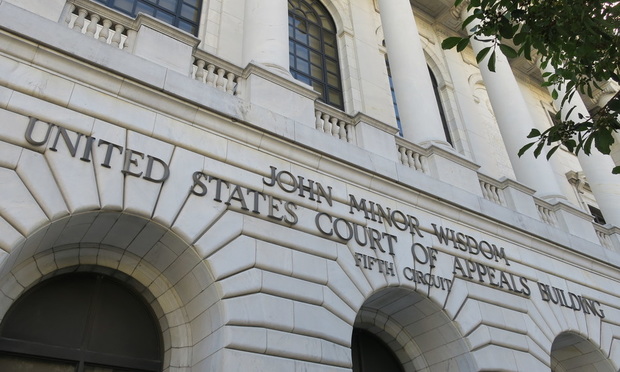 U.S. Court of Appeals for the Fifth Circuit. Credit: Mike Scarcella / ALM
U.S. Court of Appeals for the Fifth Circuit. Credit: Mike Scarcella / ALM
U.S. Justice Department lawyers tend to shrug off misconduct allegations as not worth anyone’s time, and say defense attorneys too wantonly raise claims of malfeasance in the first place. This week, a three-judge panel of the U.S. Court of Appeals for the Fifth Circuit offered its support for prosecutors.
The panel’s supportive words came in a footnote in the court’s ruling largely upholding the conviction and 17-year prison sentence of an Austin lawyer named Patrick Lanier. Prosecutors had argued Lanier was involved in a conspiracy that used fake stock and real estate investments to fleece investors out of hundreds of millions of dollars. Prosecutors also accused Lanier of helping a former client, Harris “Butch” Ballow, evade arrest in Mexico.
The Fifth Circuit panel took issue with the prosecutorial misconduct claims that Lanier’s attorneys raised earlier in the U.S. District Court for the Southern District of Texas.
Lanier had leveled misconduct allegations against an assistant U.S. attorney named John Lewis, arguing that the prosecutor had a conflict of interest that should have disqualified him from the case. Lanier’s attorneys noted that, while representing Ballow years earlier, Lanier had accused Lewis of prosecutorial misconduct.
“The accusation was frivolous and incomprehensible; it went nowhere. Lanier’s unilateral act—an unfounded, unpursued, difficult to-parse accusation—did not create a conflict of interest forever disqualifying Lewis from prosecuting Lanier,” Senior Judge Thomas Reavley, who authored the panel opinion, said about the earlier misconduct claim.
In the footnote, Reavley wrote:
“Regrettably, this very appeal shows how loose counsel can be with accusations of prosecutorial misconduct. While attorneys must zealously represent their clients, we lament the willingness of Lanier’s counsel to distort the record and challenge opposing counsel’s integrity with accusations that (in our view) could not have been made in good faith.”
Along with the conflict of interest claim, Lanier argued that Lewis had improperly shared information from the criminal investigation of Ballow with an attorney in a civil case brought by the Texas oilman Jakie Sandefer.
In a May 2017 court filing, Lanier’s attorney, Mervyn Mosbacker, described Sandefer as “a politically well-connected individual who had filed several civil actions against Ballow.” Sandefer, hoping to collect on a multimillion-dollar civil judgment, had hired a private investigator to find Ballow after he became a fugitive, according to the Justice Department. In 2010, Mexican authorities arrested Ballow in Nuevo Vallarta and later extradited him to the United States, where he was sentenced to 10 years in prison for money laundering and ordered to pay $10 million in restitution.
Lanier argued that, after disclosing information from the criminal investigation to Sandefer’s counsel, Lewis teamed up with them in the probe that led to his indictment. In light of that move, Lanier argued, “there is certainly a question of whether there are conflicting loyalties of the part of the U.S. attorney.”
The Fifth Circuit panel on Wednesday, siding with the Justice Department, said it could “find nothing resembling objectionable conduct on Lewis’s part.”
“We have reviewed the record as it relates to this accusation and find that Lewis acted at all times with a proper investigative purpose, in the clear interest of his office, and in an open and forthright manner,” Reavley wrote.
Read more:
Austin Lawyer Heads to Prison for Fraud
DOJ’s Criminal Division Chief Apologizes to Prosecutors for Her Criticism
D.C. Judges Weigh Rule to Curb Prosecutor Misconduct
Justice Department Rebuts Judge Kozinski’s Criticism of Prosecutors


